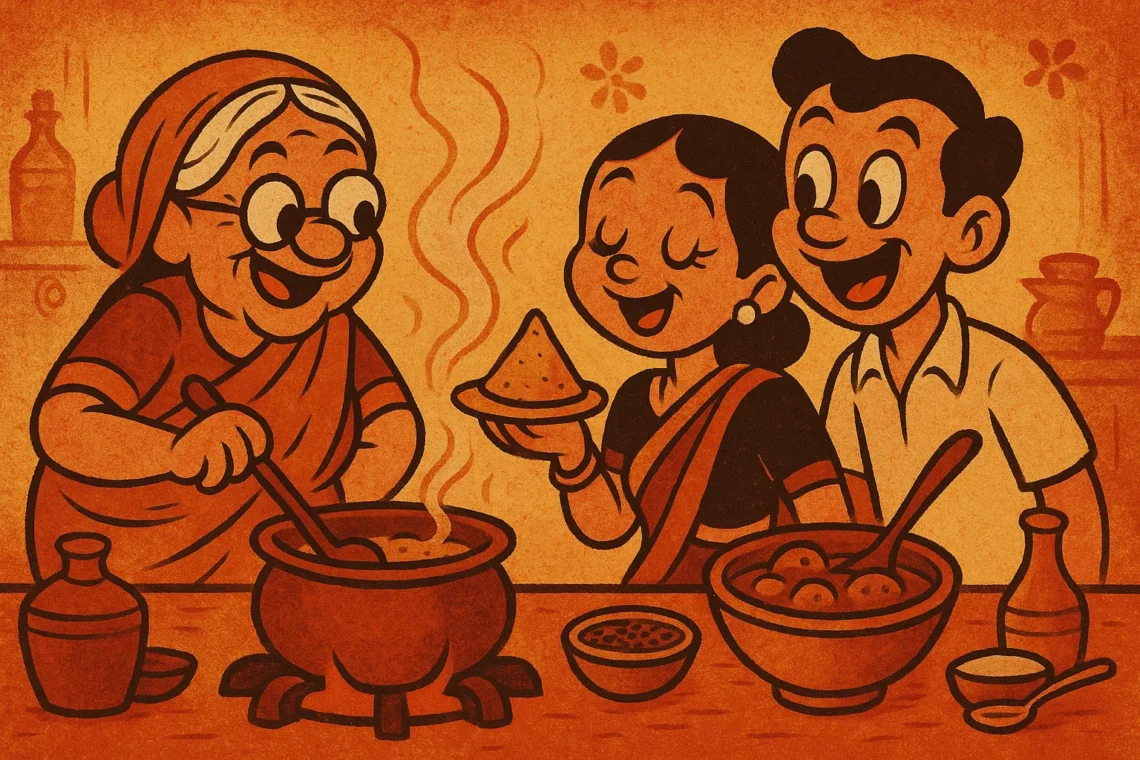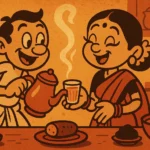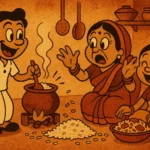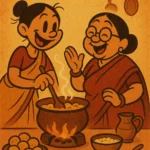Growing up in Mumbai, I learned many things from my grandmother. Some were practical, like how to fold a perfect roti or the secret to making the best masala chai. But then there were the sayings—those little pearls of wisdom that seemed to come out of nowhere, sometimes making sense, sometimes puzzling me. One such saying that’s stayed with me all these years is, “Too much jeera turns love bitter.” At first, I thought it was just another quirky piece of advice. I mean, jeera (cumin) was a regular in our kitchen, an everyday spice that added warmth and depth to our curries. How could it possibly turn love bitter?
It wasn’t until much later that I realized the deeper meaning behind her words. Food in Indian culture isn’t just about flavor or nutrition; it’s about relationships—between people, between tradition, and between the earthly and the divine. That simple phrase about jeera wasn’t about cooking at all; it was about balance, harmony, and the importance of moderation in all things, especially love.
The Spice That Represents So Much More
Jeera, or cumin, is one of those humble ingredients that doesn’t demand the spotlight but quietly works its magic in the background. It’s often the base for many Indian dishes, roasted to bring out its earthy, warm flavors. And yet, it holds more than just culinary significance. In Indian folklore, jeera is seen as a symbol of purity and balance. It’s used in religious rituals, believed to ward off evil spirits, and even considered to have medicinal properties. It’s also a spice that, when used right, can elevate a dish; but, as Grandma said, “too much jeera turns love bitter.”
This saying wasn’t just a cooking tip—it was a lesson in life. Too much of anything, even something as simple as jeera, can overpower the balance. Whether it’s the balance in a dish or the balance in a relationship, moderation is key. Just as cumin adds flavor when used sparingly, but can easily turn overpowering if added in excess, love too requires a delicate balance of care, patience, and respect. Too much of any one thing—be it affection, attention, or expectation—can cause bitterness to seep in. Grandma’s words were a gentle reminder that harmony is found in moderation.
The Role of Spice in Love and Tradition
Spices in Indian culture go beyond the kitchen. They are symbols of life, love, and growth. In fact, many traditional Indian marriage rituals involve the use of spices, with their rich flavors acting as metaphors for the complexities of love and relationships. In some regions, couples exchange garlands made of marigold, and spices like turmeric and saffron are used in their wedding ceremonies to symbolize purity, strength, and the sacred bond they are about to enter.
When I think about how my grandmother used jeera, I realize it wasn’t just a matter of seasoning. It was an act of balancing flavors, of ensuring that everything in the dish—every ingredient—worked together in harmony. The same applies to relationships. There’s a reason why food metaphors are so popular in Indian culture. They remind us that relationships, much like a perfect curry, need the right balance of ingredients, the right amount of heat, and the perfect amount of time. You can’t rush it. And you can’t overwhelm it. It’s a slow process of bringing everything together, just like how jeera works in a curry.
The Sweet Side of Life: Finding the Right Balance
In Indian kitchens, we often find the perfect contrast between savory and sweet. After all, life is a mix of both, right? The sweet moments in life are just as important as the savory, and both need to be balanced. But, like jeera in a curry, too much sweetness can overwhelm the dish, just as too much bitterness can throw it off balance. That’s why my grandmother’s cooking was so special—she understood that balance was the key to making everything work together. From the soft, pillowy puris to the perfectly spiced curries, every dish had its own harmonious balance. And that’s what made it unforgettable.
She didn’t just teach us how to cook; she taught us how to live. Just like her food, life requires balance. Too much of one thing can ruin it, whether it’s jeera or love. It’s a delicate dance of flavors—sometimes spicy, sometimes sweet, but always balanced. When we overdo something, we lose that delicate harmony. But when we find that sweet spot, life, like food, becomes richer, more satisfying.
What It Means Today
Now that I’m living in Austin, far from the bustling kitchens of Mumbai, I still carry Grandma’s wisdom with me. I still cook with jeera, and I still think of her when I do. Every time I add it to a dish, I’m reminded of the delicate balance required not just in cooking, but in life. It’s funny how a simple spice like jeera can teach you so much about love, moderation, and the importance of small, thoughtful gestures. I often make a dish of jeera rice when I’m missing home, and when the aroma fills the room, it’s like a little piece of my grandmother’s kitchen is right here with me, offering me a lesson in life through the simplest of ingredients.
Food, like love, is meant to be enjoyed in moderation. It’s the little things that bring the most joy—the right amount of heat, the right amount of sweetness, and, of course, the right amount of jeera. Grandma was right: too much jeera can turn love bitter, but when used just right, it makes everything better. That’s the real recipe for happiness—finding balance in every bite and every moment.
The Spice of Life
When I reflect on my grandmother’s wisdom, I realize that food was never just about what we ate. It was about the lessons we learned from it, the stories we passed down, and the connections we made through it. Jeera, in its simplicity, was a reminder that life, much like cooking, needs a balance of flavors. Too much of anything can throw us off course, but when we find that balance, everything works. In the kitchen and in life, it’s all about finding the right amount of spice to make things just right. And in the end, that’s the real secret to cooking, love, and living: balance.
Born in Mumbai, now stir-frying feelings in Texas. Writes about food, memory, and the messy magic in between — mostly to stay hungry, sometimes just to stay sane.












